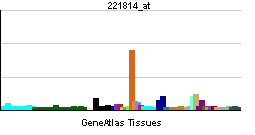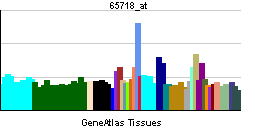GPR124
| G protein-coupled receptor 124 | |||||||||||
|---|---|---|---|---|---|---|---|---|---|---|---|
| Identifiers | |||||||||||
| Symbols | GPR124 ; DKFZp434C211; DKFZp434J0911; FLJ14390; KIAA1531; TEM5 | ||||||||||
| External IDs | Template:OMIM5 Template:MGI HomoloGene: 13112 | ||||||||||
| |||||||||||
| RNA expression pattern | |||||||||||
 | |||||||||||
 | |||||||||||
| More reference expression data | |||||||||||
| Orthologs | |||||||||||
| Template:GNF Ortholog box | |||||||||||
| Species | Human | Mouse | |||||||||
| Entrez | n/a | n/a | |||||||||
| Ensembl | n/a | n/a | |||||||||
| UniProt | n/a | n/a | |||||||||
| RefSeq (mRNA) | n/a | n/a | |||||||||
| RefSeq (protein) | n/a | n/a | |||||||||
| Location (UCSC) | n/a | n/a | |||||||||
| PubMed search | n/a | n/a | |||||||||
G protein-coupled receptor 124, also known as GPR124, is a human gene.[1]
References
Further reading
- Nakajima D, Okazaki N, Yamakawa H; et al. (2003). "Construction of expression-ready cDNA clones for KIAA genes: manual curation of 330 KIAA cDNA clones". DNA Res. 9 (3): 99–106. PMID 12168954.
- Nagase T, Kikuno R, Ishikawa K; et al. (2000). "Prediction of the coding sequences of unidentified human genes. XVII. The complete sequences of 100 new cDNA clones from brain which code for large proteins in vitro". DNA Res. 7 (2): 143–50. PMID 10819331.
- Carson-Walter EB, Watkins DN, Nanda A; et al. (2001). "Cell surface tumor endothelial markers are conserved in mice and humans". Cancer Res. 61 (18): 6649–55. PMID 11559528.
- Strausberg RL, Feingold EA, Grouse LH; et al. (2003). "Generation and initial analysis of more than 15,000 full-length human and mouse cDNA sequences". Proc. Natl. Acad. Sci. U.S.A. 99 (26): 16899–903. doi:10.1073/pnas.242603899. PMID 12477932.
- Fredriksson R, Gloriam DE, Höglund PJ; et al. (2003). "There exist at least 30 human G-protein-coupled receptors with long Ser/Thr-rich N-termini". Biochem. Biophys. Res. Commun. 301 (3): 725–34. PMID 12565841.
- Ota T, Suzuki Y, Nishikawa T; et al. (2004). "Complete sequencing and characterization of 21,243 full-length human cDNAs". Nat. Genet. 36 (1): 40–5. doi:10.1038/ng1285. PMID 14702039.
- Yamamoto Y, Irie K, Asada M; et al. (2004). "Direct binding of the human homologue of the Drosophila disc large tumor suppressor gene to seven-pass transmembrane proteins, tumor endothelial marker 5 (TEM5), and a novel TEM5-like protein". Oncogene. 23 (22): 3889–97. doi:10.1038/sj.onc.1207495. PMID 15021905.
- Bjarnadóttir TK, Fredriksson R, Höglund PJ; et al. (2005). "The human and mouse repertoire of the adhesion family of G-protein-coupled receptors". Genomics. 84 (1): 23–33. doi:10.1016/j.ygeno.2003.12.004. PMID 15203201.
- Vallon M, Essler M (2006). "Proteolytically processed soluble tumor endothelial marker (TEM) 5 mediates endothelial cell survival during angiogenesis by linking integrin alpha(v)beta3 to glycosaminoglycans". J. Biol. Chem. 281 (45): 34179–88. doi:10.1074/jbc.M605291200. PMID 16982628.
| Stub icon | This membrane protein–related article is a stub. You can help Wikipedia by expanding it. |